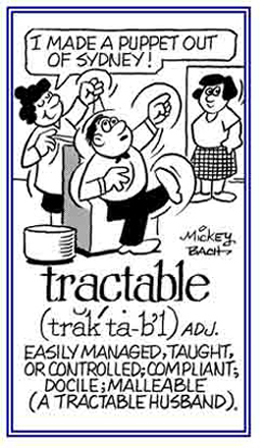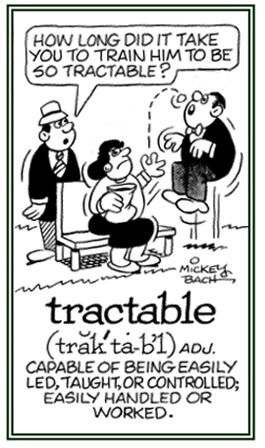tra-, tract-, trac-, -tractive, -traction, -tracting, treat-, trai-
(Latin: drag, draw together; a drawing out or pulling)
trace (s), traces (pl)
1. A sign that remains to show the former presence of someone or something which is no longer around.
2. A tiny amount of something, a barely perceivable indication, or an amount of something which is detectable, but which is too small to be quantified (measured or counted).
3. Footprints, visible marks, or other physical signs of the movements of humans or animals; such as, footprints, that have been made or left by the actions of people, animals, or things.
4. An attempt to find or to follow someone or something.
5. A constituent, such as a chemical compound or an element, present in quantities that are less than a standard limit or amount.
2. A tiny amount of something, a barely perceivable indication, or an amount of something which is detectable, but which is too small to be quantified (measured or counted).
3. Footprints, visible marks, or other physical signs of the movements of humans or animals; such as, footprints, that have been made or left by the actions of people, animals, or things.
4. An attempt to find or to follow someone or something.
5. A constituent, such as a chemical compound or an element, present in quantities that are less than a standard limit or amount.
trace (verb), traces; traced; tracing
1. To find out where someone or something is or who or what anyone or something was; such as, to trace a wounded buffalo; tracing a missing child.
2. To follow or to show the course or series of developments of something, or be able to be followed back in time or to a source; for example, to determine the successive stages in the development or progress of someone or something; tracing the life cycle of an ant colony; traced the history of a family ancestry.
3. To copy writing, a design, or drawing by putting translucent paper on top of it and drawing the visible outlines on that paper.
4. To locate or to discover something by searching or researching available evidence; such as, to trace the cause of a disease or a mental illness.
5. To locate origins or to be able to locate the linguistic features of words back to their beginnings: "Scholars can determine the historical origins of English words by tracing them to their Germanic, French, and Latin or Greek origins."
2. To follow or to show the course or series of developments of something, or be able to be followed back in time or to a source; for example, to determine the successive stages in the development or progress of someone or something; tracing the life cycle of an ant colony; traced the history of a family ancestry.
3. To copy writing, a design, or drawing by putting translucent paper on top of it and drawing the visible outlines on that paper.
4. To locate or to discover something by searching or researching available evidence; such as, to trace the cause of a disease or a mental illness.
5. To locate origins or to be able to locate the linguistic features of words back to their beginnings: "Scholars can determine the historical origins of English words by tracing them to their Germanic, French, and Latin or Greek origins."
traceable (adjective), more traceable, most traceable
1. Able to be sought out or discovered: The detectives hunted for traceable evidence when they searched the house, but they didn't find any!
2. Capable of describing the origin of something: Many of the U.S. Presidents are traceable back to the New England colonists.
2. Capable of describing the origin of something: Many of the U.S. Presidents are traceable back to the New England colonists.
traceableness
traceably (adverb), more traceably, most traceably
Denoting how something can be tracked or detected: The barking Jack heard was traceably connected with the neighbor's dog that was chained to the post in the backyard.
tracer
tracery
tract
1. The ability of being easily managed or controlled; docile; yielding: Little Susi was known for her tractability, because she was easily persuaded to help in the kitchen if she could watch TV afterwards!
2. The capacity of something which can be easily worked, shaped, or otherwise handled; malleable: The tractability of the clay to make a vase proved to be effortless to knead and form.
2. The capacity of something which can be easily worked, shaped, or otherwise handled; malleable: The tractability of the clay to make a vase proved to be effortless to knead and form.
tractable (adjective), more tractable, most tractable
1. Capable of being easily taught, led, or controlled; docile and manageable: Jim's little boy has been a very tractable or obedient child.
2. Etymology: from Latin tractabilis, "that may be touched or handled, workable, tangible, manageable"; from tractare, "to handle, to manage."

© ALL rights are reserved.

© ALL rights are reserved.
Go to this Word A Day Revisited Index
2. Etymology: from Latin tractabilis, "that may be touched or handled, workable, tangible, manageable"; from tractare, "to handle, to manage."


Go to this Word A Day Revisited Index
so you can see more of Mickey Bach's cartoons.
tractableness
tractably (adverb), more tractably, most tractably
Relating to how a person is obedient and flexible: Max learned from his parents and teachers how to behave tractably and compliantly, at home and at school.
tractate
tractenjophilist
A collector of steam rollers.
tractile


